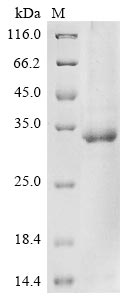In baculovirus cells, the generation of the recombinant Human PARP9 protein includes integrating a DNA fragment encoding the Human PARP9 protein (628-854aa) into a plasmid vector and transforming this vector into baculovirus cells. Cells containing the plasmid are screened, cultured, and induced to yield the PARP9 protein. A N-terminal 10xHis tag and C-terminal Myc tag is attached to the protein. Lysis of the cells facilitates the collection of the recombinant Human PARP9 protein, which is subjected to affinity purification and then SDS-PAGE analysis and subsequent staining of the gel with Coomassie Brilliant Blue. The purity of the obtained recombinant Human PARP9 protein is greater than 85%.






